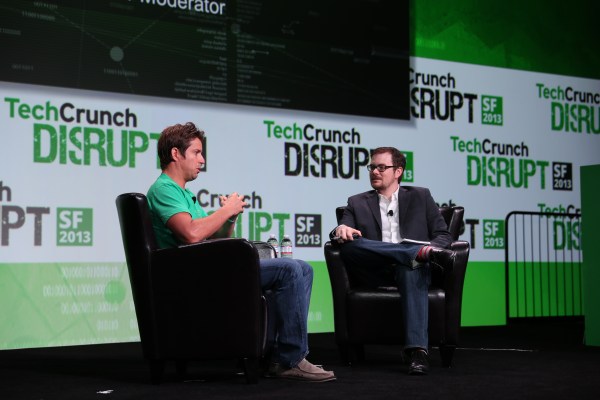It’s hardware day here at Disrupt SF and this morning’s sessions kicked off with an interview with Nicholas Woodman, founder and CEO of action camera company GoPro. Woodman discussed how the GoPro evolved from being a wrist-mounted prototype he came up with on a surfing trip to today’s hugely successful clip-on-anywhere lens that can capture the action from a variety of perspectives.
With the current hype around wearables that trajectory is especially interesting, not least when you consider eye-level wearables like Google Glass. Asked whether GoPro is working on a Google Glass style product, Woodman suggested that while the company is looking at the space it’s more with a view to thinking about how to interoperate with those type of devices, rather than making a dedicated pair of GoPro Glasses itself.
“I think what’s going to be exciting is you’re going to see more of these products working together,” said Woodman. “You already see it with GoPro and smartphones and people often ask me are you afraid of the smartphone? And the answer is no — the smartphone is helping our business because it’s killing traditional cameras… which is opening up retail shelf space for GoPro and opening up consumer dollars for GoPro.”
GoPro is clearly (yet) another device that’s tapping into the snowballing trend to augment and extend the smartphone user experience with a variety of additional hardware sensors. Sure, it’s not a wet-behind-the-ears hardware startup just coming up on Kickstarter — GoPro started out around 2004 — but as auxiliary connected hardware with something extra to offer it’s also positioned to benefit from the ubiquity of smartphones.
Woodman argued that he sees a similar potential for GoPro to work in concert with any commercial Glass type products that emerge in future. “GoPro is used in a totally different way to a traditional camera, and then beyond that the smartphone makes for an incredible video remote control for a GoPro right?” said Woodman. “Now I can preview and control my GoPro with my smartphone, playback my videos and share them directly from the smartphone. Never needing to hook my GoPro to a computer.
“And then you think of things like Glass and what not — a Glass-like product become terrific heads-up hands-free remote control devices for the GoPros and I think it’s just going to become more and more enabling and you’re going to be able to use your GoPro in even more versatile ways thanks to these complementary products.”
Asked what it would take for Google Glass to become a serious competitive to GoPro, Woodman said he could envisage Glass-style products owning the first person perspective in future but stressed that’s just one aspect of what GoPro does.
“I think that devices like Glass are going to do a terrific job of capturing your first person perspective. And that’s what people first think of when they think of GoPro,” he said. “But go and look at the content that you see being created and shared with GoPro. And look at the perspectives that are making up the content and you recognise that this first person view is one of hundreds of perspectives, thousands of perspectives. That’s really what GoPro’s all about: enabling this versatility.
“GoPro’s the world’s best selling camera because of this versatility — because it isn’t a one thing for one person. And it’s also the world’s best selling camera for professional production companies on a volume basis because of what it enables you to do. So then you recognise that — that GoPro’s strength is in its versatility — and then you pull back out to a Google Glass and while you recognise that that is very good for that purpose it doesn’t lend itself well to the world of GoPro.”
That said, Woodman said the company is not feeling complacent about potentially having a Mountain View sized competitor, in the not too distance future. “We’ve very careful to be very appreciative for the success that we have right now but also we still wake up sacred every morning. You know we’re smart but we’re not that smart. Fear drives you a lot harder than success does,” he added.
Backstage Interview
